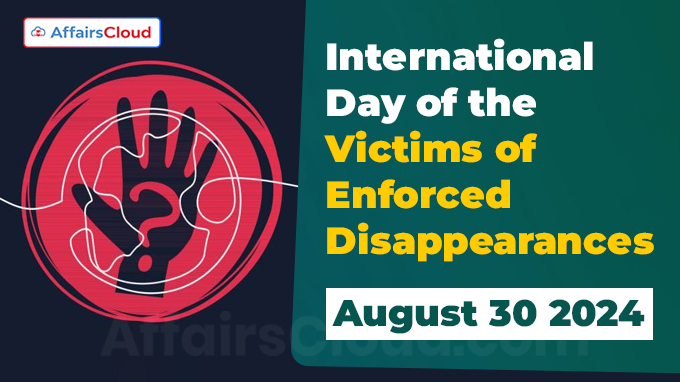 The United Nations (UN)’s International Day of the Victims of Enforced Disappearances is annually observed across the globe on 30 August to raise awareness about enforced or involuntary disappearances worldwide.
The United Nations (UN)’s International Day of the Victims of Enforced Disappearances is annually observed across the globe on 30 August to raise awareness about enforced or involuntary disappearances worldwide.
- The day also aims to pay respect to those who have undergone enforced disappearances and provide effective access to justice for victims of enforced disappearances.
Background:
i.On 21st December 2010, the United Nations General Assembly (UNGA) adopted the resolution A/RES/65/209, proclaiming the 30th of August of every year as the International Day of the Victims of Enforced Disappearances.
- By the same resolution, the UNGA welcomed the adoption of the International Convention for the Protection of All Persons from Enforced Disappearance (ICPPED).
ii.The first-ever International Day of the Victims of Enforced Disappearances was observed on 30 August 2011.
International Convention for the Protection of All Persons from Enforced Disappearance (ICPPED):
i.On 20th December 2006, the UNGA adopted the resolution A/RES/61/177 titled “International Convention for the Protection of All Persons from Enforced Disappearance (ICPPED).”
ii.It entered into force in 2010 after 20 States had ratified or acceded to it. The Convention established the Committee on Enforced Disappearances (CED).
- The CED is the body of independent experts that monitors the implementation of the ICPPED by the State parties.
iii.The Convention obligates States Parties to prevent and punish the crime of enforced disappearances.
Enforced Disappearances:
i.Article 2 of the ICPPED and the Preamble of the Declaration on the Protection of all Persons from Enforced Disappearance (1992), define “Enforced disappearances” as the:
- Arrest, detention, abduction, or any deprivation of liberty by State agents or authorised groups, support, or acquiescence of the State.
ii.It includes refusing to acknowledge the deprivation of liberty or concealment of the person’s fate or whereabouts, placing them outside legal protection.
iii.The 1992 Declaration is a universal set of principles applicable to all states.
iv.Sri Lanka has one of the world’s highest rates of enforced disappearance. It includes:
- The disappearances during the leftist Janatha Vimukthi Peramuna (JVP) insurgency (1987-89); and
- The civil war between the government and the separatist Liberation Tigers of Tamil Eelam (LTTE) (1983-2009).
Cumulative Elements:
Enforced Disappearances are characterised by 3 cumulative elements (defined in A/HRC/16/48/Add.3):
- Deprivation of liberty against the will of the person;
- Involvement of government officials, at least by acquiescence;
- Refusal to acknowledge the deprivation of liberty or concealment of the fate or whereabouts of the disappeared person.
World Congress on Enforced Disappearances:
i.The first-ever World Congress on Enforced Disappearances (WCED) will be held on January 15-16, 2025, at the International Conference Center Geneva (CICG) in Switzerland.
ii.The Congress will gather States, victims, Human Rights Organisations (HROs), etc. to develop concrete action plans to eliminate and prevent enforced disappearances.
iii.The WCED is co-organized by the Convention Against Enforced Disappearances Initiative (CEDI), the UN CED, the United Working Group on Enforced or Involuntary Disappearances (WGEID), and the Office of the UN High Commissioner for Human Rights (OHCHR).
International Commission on Missing Persons (ICMP):
i.ICMP is a treaty-based intergovernmental organisation mandated to secure the cooperation of governments and others in locating missing persons from conflict, human rights abuses, disasters, etc. to assist them in doing so.
ii.It is the only international organisation tasked exclusively to work on the issue of missing persons and also supports the work of other organizations in their efforts.
About the International Commission on Missing Persons (ICMP):
Director-General– Kathryne Bomberger
Headquarters– The Hague, The Netherlands
Established in 1996




